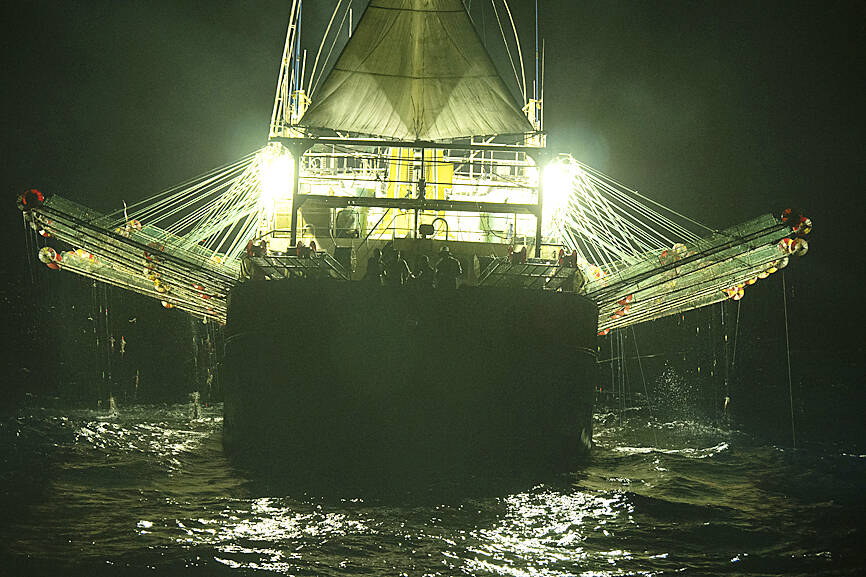Hazardous, forced work conditions sometimes akin to slavery have been detected on about 500 industrial fishing vessels worldwide, but identifying those responsible for abuses at sea is hampered by a lack of transparency and regulatory oversight, a new report concluded.
The research by the Financial Transparency Coalition, a Washington-based nonprofit organization that tracks illicit money flows, is the most comprehensive attempt to date to identify the companies operating vessels where tens of thousands of workers every year are estimated to be trapped in unsafe conditions.
The report, published on Wednesday, found that a quarter of vessels suspected of abusing workers are flagged to China, whose distant water fleet dominates fishing on the high seas, traditionally lawless areas beyond the jurisdiction of any single country. Vessels from Taiwan, Russia, Spain, Thailand and South Korea were also accused of mistreatment of fishers.

Photo: Sea Shepherd via AP
Forced labor in the seafood industry is a rarely seen but common phenomenon, one increasingly recognized as a “widespread human rights crisis,” the report says.
The Associated Press in 2015 uncovered the plight of thousands of migrant workers from Myanmar, Cambodia and Laos who were abused while employed on Thai vessels whose catch often ended up in the US.
Globally, as many as 128,000 fishers face threats of violence, debt bondage, excessive overtime and other conditions indicative of forced labor, the UN’s International Labor Organization said.
The US and European companies are under increasing pressure to clean up supply chains in labor-intensive industries where worker abuse is widespread. The Financial Action Task Force set up by the G7 countries has identified illegal logging and mining as a key driver of money laundering and encouraged its members to set up publicly available databases to raise awareness about the financial flows that fuel environmental crimes.
However, the seafood industry has so far escaped the same scrutiny, in part because governments often lack the tools to regulate what takes place hundreds of kilometers from land. This week, US President Joe Biden’s administration decided to abandon a planned expansion of the flagship Seafood Import Monitoring Program used to prevent illegal fishing and forced labor on foreign vessels, which supply about 80 percent of the seafood US citizens eat.
“We are once again seeing the heartbreaking reality of what is happening on some commercial fishing vessels out at sea and it’s completely unacceptable,” Beth Lowell, vice president of the conservation group Oceana based in the US, said about the report, in which she had no role. “Forced labor and other human rights abuses should not be the cost for a seafood dinner.”
Offenders are frequently licensed by governments like Panama and Belize with reputations for financial secrecy and minimal oversight of their fleets. Of the vessels suspected of abuse and whose ownership could be identified by the Financial Transparency Coalition, 18 percent flew so-called flags of convenience companies use to avoid careful examination and hide their shareholder structure.
The report identified two Chinese companies — ZheJiang Hairong Ocean Fisheries Co (浙江海融遠洋漁業) and Pingtan Marine Enterprises Ltd (平潭海洋實業) — as the worst offenders, with 10 and seven vessels respectively, accused of human rights violations. A third company, Chinese state-owned China National Fisheries Corp (中國水產), had five.

‘EYE FOR AN EYE’: Two of the men were shot by a male relative of the victims, whose families turned down the opportunity to offer them amnesty, the Supreme Court said Four men were yesterday publicly executed in Afghanistan, the Supreme Court said, the highest number of executions to be carried out in one day since the Taliban’s return to power. The executions in three separate provinces brought to 10 the number of men publicly put to death since 2021, according to an Agence France-Presse tally. Public executions were common during the Taliban’s first rule from 1996 to 2001, with most of them carried out publicly in sports stadiums. Two men were shot around six or seven times by a male relative of the victims in front of spectators in Qala-i-Naw, the center

Incumbent Ecuadoran President Daniel Noboa on Sunday claimed a runaway victory in the nation’s presidential election, after voters endorsed the young leader’s “iron fist” approach to rampant cartel violence. With more than 90 percent of the votes counted, the National Election Council said Noboa had an unassailable 12-point lead over his leftist rival Luisa Gonzalez. Official results showed Noboa with 56 percent of the vote, against Gonzalez’s 44 percent — a far bigger winning margin than expected after a virtual tie in the first round. Speaking to jubilant supporters in his hometown of Olon, the 37-year-old president claimed a “historic victory.” “A huge hug

Two Belgian teenagers on Tuesday were charged with wildlife piracy after they were found with thousands of ants packed in test tubes in what Kenyan authorities said was part of a trend in trafficking smaller and lesser-known species. Lornoy David and Seppe Lodewijckx, two 19-year-olds who were arrested on April 5 with 5,000 ants at a guest house, appeared distraught during their appearance before a magistrate in Nairobi and were comforted in the courtroom by relatives. They told the magistrate that they were collecting the ants for fun and did not know that it was illegal. In a separate criminal case, Kenyan Dennis

The US will help bolster the Philippines’ arsenal and step up joint military exercises, Manila’s defense chief said, as tensions between Washington and China escalate. The longtime US ally is expecting a sustained US$500 million in annual defense funding from Washington through 2029 to boost its military capabilities and deter China’s “aggression” in the region, Philippine Secretary of Defense Gilberto Teodoro said in an interview in Manila on Thursday. “It is a no-brainer for anybody, because of the aggressive behavior of China,” Teodoro said on close military ties with the US under President Donald Trump. “The efforts for deterrence, for joint resilience